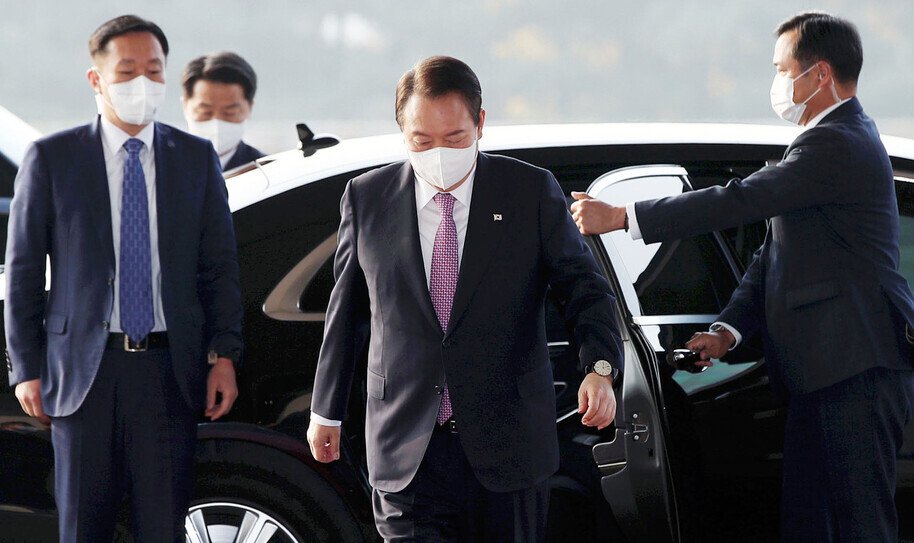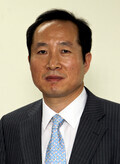hankyoreh
Links to other country sites 다른 나라 사이트 링크
[Column] I awoke one morning and found Korea less advanced


By Park Hyun, editorial writer
Recently, South Korea seems to have reached a point where the functions of the state in almost all fields, including politics, foreign policy, society, and economy, are not working properly. A series of recent events have proven that there is a big hole in the country’s state management system.
Last year, a book titled “Advanced Country Already, But Not Yet” drew much attention in Korea. This year, however, everyone seems to be talking about South Korea as an “underdeveloped country.”
The disaster that took place less than a mile away from the presidential office in Yongsan is a terrible example of the absence of the state. When an event with a large crowd is held, establishing safety management measures in advance should come before all else.
Nevertheless, neither the central nor local governments took the initiative. Four hours before the disaster took place, citizens sent urgent warnings of an impending crisis to authorities, but not a single organization responded in a timely manner. The crisis management system also failed to function properly.
In reality, police and local government officials were not even where they were supposed to be. Meanwhile, the office of state affairs at the presidential office and the Ministry of Interior and Safety’s Central Disaster and Safety Countermeasures Headquarters — the control towers that are supposed to serve a mediating function for the relevant organizations — were also nowhere to be seen.
Despite this, those in charge of the control towers made excuses, saying it was not their responsibility (Kim Dae-ki, presidential office chief of staff), or that they had not received a report about the situation (Lee Sang-min, Minister of the Interior and Safety). These individuals were quick to try and shift the responsibility and blame off themselves and onto others. It is highly unfortunate that people with such attitudes hold such important positions in this country.
Things are not going much better in the financial or economic sectors either. In the economic sector, repeated cases of government officials’ slow response are adding to financial market instability. For instance, the government neglected the bond market crunch due to the Legoland development fiasco for nearly a month.
While officials in the financial sector were also aware of the issue, no one was willing to step up. It was only after the financial crunch spread that officials hastily came up with measures to supply liquidity of “50 trillion won plus alpha.”
In addition, last week Heungkuk Life Insurance announced a delay in the early repayment of new capital securities, putting the bond market back on edge.
Although financial authorities were aware of the announcement in advance, they still failed to take any action. Is this because they didn't know that even a small risk factor could become a dangerous fire that can quickly spread at times when the financial market is already treading on thin ice?
When meeting with reporters on Wednesday, Kim Joo-hyun, chairman of the Financial Services Commission, showed a shameless attitude as he refused to admit that the government’s slow response had heightened market anxiety and took absolutely no responsibility for the current financial situation.
The public sector is currently on shaky ground, but the truth is it has been this way for a long time already. The country is a mess, but bureaucrats go as far as calling current times a “reign of peace.” Despite the risks for all sorts of serious issues running high, no one is so much as offering to step up to the plate to take a swing at addressing them.
Following the diplomatic disaster, big incidents have continued to occur one after another in society and the economy as well. This proves that those currently in power have reached a fundamental limit in their ability to carry out state affairs.
The elites of the prosecution service, who are currently at the center of power in this country, have no experience in running state affairs. Meanwhile, administrative officials, including the “mofia” (former Ministry of Finance officials who have taken up high-level positions in the government), who have joined hands with these elites as lower-level partners, are only busy minding those at the core of power instead of doing their jobs properly.
How did the state system suddenly become such a mess that we even have to worry about the fall of our national dignity? The biggest cause of this lies with the leadership of the country.
Leaders in any organization set priorities, provide direction, and take responsibility for the results. The leader takes the initiative and sets an example in everything and promises to take final responsibility for sensitive issues while empowering and encouraging to ensure the organization runs smoothly. This kind of leadership is all the more necessary when it comes to large government organizations.
If, like President Yoon Suk-yeol, bureaucrats don’t acknowledge their responsibilities but instead choose to protect those in their inner circle and place the blame on those at the bottom, they will not only be disloyal but also grow apathetic. They will end up only caring about themselves, being focused only on whether any potential damage could come to them.
The second issue is that of bureaucracy itself. In the past era of Korea’s development, bureaucrats were seen as a competent group, but this is no longer the case. These people do not see the world from the perspective of the lower classes because they have already become a part of the ruling class.
This is clearly reflected in the behavior of elite bureaucrats like Prime Minister Han Duck-soo, presidential Chief of Staff Kim Dae-ki, and Minister of the Interior and Safety Lee Sang-min, who all failed to show their ability to empathize with the people.
Yoon must realize that his way of managing state affairs has been wrong and implement a complete overhaul of the current system. Above all, a full-scale personnel reshuffle is needed. If the president relies too much on the prosecution service and bureaucratic elites, such crises will only continue to arise.
The government’s control tower functions must be restored by appointing talented and experienced people to key positions, regardless of partisan status. Only then will government agencies be able to function again and find clues that can lead to the stability of the state.
Please direct questions or comments to [english@hani.co.kr]

Editorial・opinion
![[Editorial] Intensifying US-China rivalry means Seoul must address uncertainty with Beijing sooner than later [Editorial] Intensifying US-China rivalry means Seoul must address uncertainty with Beijing sooner than later](https://flexible.img.hani.co.kr/flexible/normal/500/300/imgdb/original/2024/0517/8117159322045222.jpg) [Editorial] Intensifying US-China rivalry means Seoul must address uncertainty with Beijing sooner than later
[Editorial] Intensifying US-China rivalry means Seoul must address uncertainty with Beijing sooner than later![[Column] When ‘fairness’ means hate and violence [Column] When ‘fairness’ means hate and violence](https://flexible.img.hani.co.kr/flexible/normal/500/300/imgdb/original/2024/0516/7417158465908824.jpg) [Column] When ‘fairness’ means hate and violence
[Column] When ‘fairness’ means hate and violence- [Editorial] Yoon must stop abusing authority to shield himself from investigation
- [Column] US troop withdrawal from Korea could be the Acheson Line all over
- [Column] How to win back readers who’ve turned to YouTube for news
- [Column] Welcome to the president’s pity party
- [Editorial] Korea must respond firmly to Japan’s attempt to usurp Line
- [Editorial] Transfers of prosecutors investigating Korea’s first lady send chilling message
- [Column] Will Seoul’s ties with Moscow really recover on their own?
- [Column] Samsung’s ‘lost decade’ and Lee Jae-yong’s mismatched chopsticks
Most viewed articles
- 1[Editorial] Transfers of prosecutors investigating Korea’s first lady send chilling message
- 2[Exclusive] Unearthed memo suggests Gwangju Uprising missing may have been cremated
- 3S. Korea “monitoring developments” after report of secret Chinese police station in Seoul
- 4[Editorial] Intensifying US-China rivalry means Seoul must address uncertainty with Beijing sooner t
- 5Could Korea’s Naver lose control of Line to Japan?
- 6[Column] US troop withdrawal from Korea could be the Acheson Line all over
- 7Korea poised to overtake Taiwan as world’s No. 2 chip producer by 2032
- 8Korea cedes No. 1 spot in overall shipbuilding competitiveness to China
- 9Xi, Putin ‘oppose acts of military intimidation’ against N. Korea by US in joint statement
- 10Korea’s first openly trans athlete hopes to prompt a discussion by competing as herself